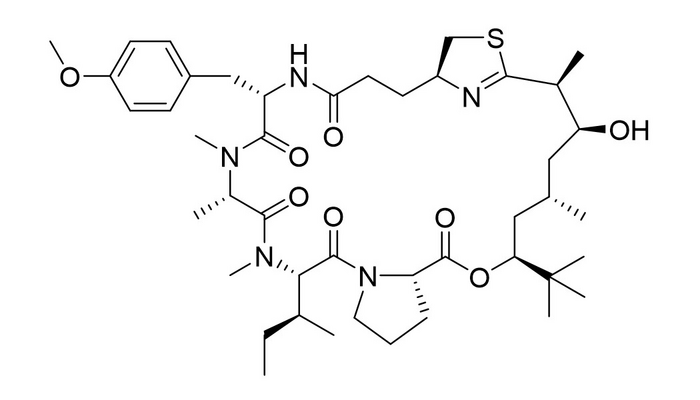More than two years into the COVID-19 pandemic, people are realizing that the “new normal” will probably involve learning to co-exist with SARS-CoV-2. Some treatments are available, but with new variants emerging, researchers are looking toward new strategies. In ACS Infectious Diseases, scientists now report that apratoxin S4, an anticancer drug candidate that targets a human protein, can interfere with the replication of many viruses, including SARS-CoV-2 and influenza A, offering a possible pan-viral therapy.

Credit: Adapted from ACS Infectious Diseases 2022, DOI: 10.1021/acsinfecdis.2c00008
More than two years into the COVID-19 pandemic, people are realizing that the “new normal” will probably involve learning to co-exist with SARS-CoV-2. Some treatments are available, but with new variants emerging, researchers are looking toward new strategies. In ACS Infectious Diseases, scientists now report that apratoxin S4, an anticancer drug candidate that targets a human protein, can interfere with the replication of many viruses, including SARS-CoV-2 and influenza A, offering a possible pan-viral therapy.
Although COVID-19 vaccines exist, some people who received the shots have still become sick with the disease, and only a fraction of the world’s population is vaccinated. That means treatments are still needed, and a few are now available that target the virus’s RNA polymerase — the enzyme it uses to make more of its own RNA inside human cells. But some of these drugs, such as remdesivir, don’t work unless given at very early stages and can require injections.
In the hunt for new ways to treat COVID-19, various teams have revisited drugs that are already known to fight other diseases, a strategy called “repurposing.” One such preclinical stage compound is apratoxin S4 (Apra S4), which is a molecule based on a natural product that has anti-cancer activity. Previous studies have shown that apratoxins can target a human protein called Sec61, which ensures that certain proteins are properly glycosylated and folded correctly. Since viruses don’t have their own machinery to do this, they hijack the process and force human cells to make functional viral proteins. Sec61 is essential for the influenza A, HIV and dengue viruses to cause infection, so Hendrik Luesch and colleagues wondered if apratoxins could be a broadly effective, pan-viral medication that could also combat SARS-CoV-2.
In tests with monkey and human cells exposed to SARS-CoV-2, the researchers found that treatment with Apra S4 reduced the number of infected cells compared with remdesivir treatment. The molecule was also effective against influenza A, Zika virus, dengue and West Nile virus infections. Further testing revealed that Apra S4 didn’t prevent SARS-CoV-2 from entering cells, but it reduced the amount of viral protein that was produced and transported in cells, especially the spike protein, and it decreased viral RNA replication. With electron microscopy, the team observed that Apra S4 also largely blocked the formation of new viruses, with many vesicles in SARS-CoV-2-exposed monkey cells having no or very few brand-new viral particles in them. The researchers say more studies are needed, but these results suggest that Apra S4 and other inhibitors of the human Sec61 protein are broadly acting antivirals that could help in the fight against future pandemics.
The authors acknowledge funding from the National Institutes of Health, the Debbie and Sylvia DeSantis Chair professorship, the Department of Defense, the Dengue Human Immunology Project Consortium, philanthropic donations, JPB Foundation, the Open Philanthropy Project and the Swiss National Science Foundation.
The complete competing interest statement by the authors is available in the paper and by request at [email protected].
The paper’s abstract will be available on June 29 at 8 a.m. Eastern time here: http://pubs.acs.org/doi/abs/10.1021/acsinfecdis.2c00008.
For more of the latest research news, register for our upcoming meeting, ACS Fall 2022. Journalists and public information officers are encouraged to apply for complimentary press registration by completing this form.
The American Chemical Society (ACS) is a nonprofit organization chartered by the U.S. Congress. ACS’ mission is to advance the broader chemistry enterprise and its practitioners for the benefit of Earth and all its people. The Society is a global leader in promoting excellence in science education and providing access to chemistry-related information and research through its multiple research solutions, peer-reviewed journals, scientific conferences, eBooks and weekly news periodical Chemical & Engineering News. ACS journals are among the most cited, most trusted and most read within the scientific literature; however, ACS itself does not conduct chemical research. As a leader in scientific information solutions, its CAS division partners with global innovators to accelerate breakthroughs by curating, connecting and analyzing the world’s scientific knowledge. ACS’ main offices are in Washington, D.C., and Columbus, Ohio.
To automatically receive news releases from the American Chemical Society, contact [email protected].
Follow us: Twitter | Facebook | LinkedIn | Instagram
Journal
ACS Infectious Diseases
DOI
10.1021/acsinfecdis.2c00008
Article Title
Sec61 Inhibitor Apratoxin S4 Potently Inhibits SARS-CoV‑2 and Exhibits Broad-Spectrum Antiviral Activity
Article Publication Date
29-Jun-2022




